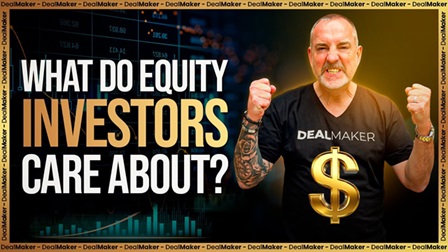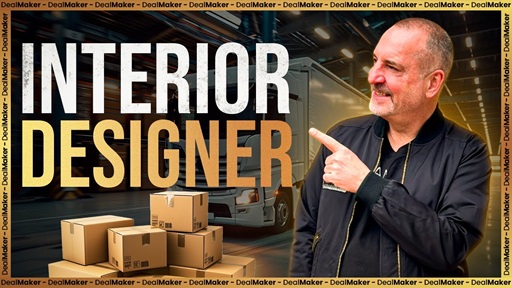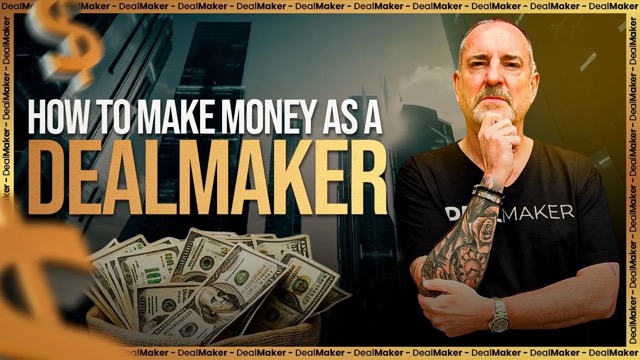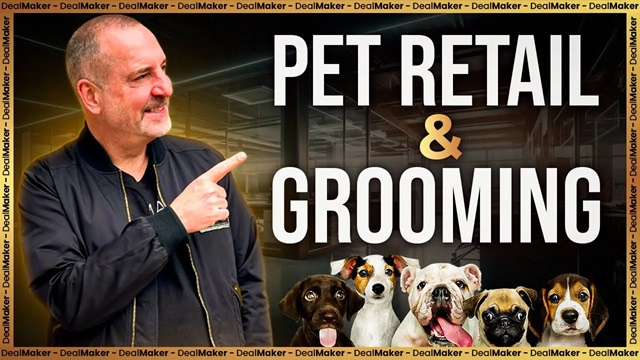Why FOCUS is Critical In A Rollup
Why FOCUS is Critical In A Rollup
Carl Allen, the mastermind behind Dealmaker Wealth Society, delivers an inspiring deep dive into focus and strategy for creating massive value in business acquisitions. With decades of experience in dealmaking, Carl is now leveraging his expertise to spearhead five industry-specific roll-ups across e-commerce, home services, professional services, engineering, and healthcare. These carefully selected sectors represent high-growth opportunities, significant demand, and the chance to create enduring value.
Carl emphasizes the power of focus in scaling a roll-up. Instead of pursuing deals randomly, his team meticulously identifies customer avatars for each sector. By understanding their demographics, psychology, and specific needs, they strategically acquire businesses that complement each other, creating robust ecosystems of products and services. For example, Carl highlights the e-learning industry as part of his e-commerce roll-up. Valued at $330 billion and forecasted to hit $1 trillion by the decade’s end, e-learning offers unparalleled growth potential fueled by shifts in education trends and rising online demand.
This focus extends to building relationships with investors who bring not just capital but also expertise. For each industry, Carl has strategically partnered with professionals who bring deep sector knowledge, enhancing the roll-ups’ operational strength, deal flow, and post-acquisition performance. By combining seller financing, creative funding structures, and leveraging investor networks, Carl’s team is acquiring businesses at favorable multiples while unlocking additional value through public listing strategies. This approach effectively doubles the value of acquired earnings upon integration.
Carl also shares actionable insights for aspiring dealmakers. From defining a precise “buy box” to sourcing deals through brokers, direct outreach, and networking, he explains the step-by-step process of identifying, acquiring, and scaling businesses. By focusing on understanding customer needs, conducting diligent evaluations, and leveraging creative financing, even new dealmakers can achieve incredible success.
Through this strategy, Carl’s roll-up in e-commerce has already secured deals generating over $5 million in profit. Plans include an IPO to access over $100 million in capital, fueling further acquisitions and growth. By combining operational synergies, scaling cash flow, and providing equity opportunities for entrepreneurs, Carl is not just creating wealth but transforming industries.
With his blend of experience, vision, and passion, Carl demonstrates that dealmaking is about more than just transactions—it’s about building value, empowering entrepreneurs, and creating legacies. His insights serve as a roadmap for anyone looking to step into the world of business acquisitions, whether starting small or aiming for large-scale roll-ups.
Full Transcript:
Hey, guys. Carl Allen. Just wanna talk to you about focus. Dealmakers, what’s up?
My vision is to completely and utterly disrupt the market for buying and selling small businesses all over the world. So one of the things that I’m doing at the moment, which is absolutely is so exciting, is I I’ve gone out through my private equity fund and have raised millions and millions and millions of dollars of of capital.
And what we’re gonna do is we’re gonna take that capital and we’re gonna leverage that up with, seller financing and other creative financing, the strategies.
And we’re gonna gonna do five roll ups in my five kind of favorite sectors of of doing deals. So let me tell you what my five key sectors are why I like them so much. And then what I then what I wanna do is I wanna kind of walk you through how we’re taking a a sector pillar and then really kind of focusing in on the sort of deals that that we’re gonna do to to build value. Right?
So my five key sectors are e com. So e com, as you know, still growing at ten percent per year, which is great. And there are some pockets of e com growing between twenty and thirty percent. So love e com, you know, amazing industry.
It’s not gonna go away. It’s even gonna get bigger.
So focus massively on that. Number two is home services.
Really focused on the kind of home services sector, through COVID.
A lot of people were, fixing up their houses and renovating.
As you know, the real estate market to clean the states, continues to be very, very strong. So there’s there’s a big demand for electrical contractors, plumbing, carpentry, power washing, landscaping, hardscaping, you know, even pest control, all those types of businesses which are really good. I love number three, professional services, Especially CPA firms, recruitment agencies, marketing agencies, PR, other businesses in all those industries, but never done a big role on. Number four is the engineering and manufacturing space. The reason I love that so much is generally the these are all break margin businesses. They’ve got lots of assets.
Baby boomer owned, and as you know, ten thousand baby boomers retiring every day, and about a third of them own a small business. So lots of retirees in that sector, so they’re legacy driven, they care about their employees, they care about their brand, they they less they less care about money, which is great. It’s why I do deals in that space. And then number five is health care.
So health care’s, an amazing industry both on the kind of the clinical level. So whether you buy chiropractors, concierge medicine businesses, physical therapy businesses, etcetera, or whether you buy into the, the technology and the services are powering healthcare. So like digital records management, you know, CRM, ERP type systems, you know, telehealth, all of that different stuff. So so really excited about those five verticals, and we’ve raised all this money.
And a lot of our partners that have invested in these in these pillars and these roll ups, we were very strategic with the investors that we got. They all have chopped in that particular industry. So I have one investor, David, who’s got a phenomenal wealth of of business and investing and deal experience.
Is invested in each of my five pillars, but then, you know, I’ve got doctors, and medical professionals invested in my healthcare pillar, I’ve got CPAs, invested in my professional services pillar, I’ve got engineering execs invested in my engineering for that. So I’m not just taking their money, which is one thing. I’m taking their brain power, their skills, their experiences, and their networks as well. So that’s gonna help me with deal flow.
It’s gonna help me closing the deals, and it’s also gonna help me growing and improving and optimizing the businesses when I bought them. But let’s go back to focus. So focus is really important because you you’ll take a pillar, and even though a pillar is by nature a focal point, it’s still very, very wide. So take econ for example.
So econ also includes like SAS. So that’s two pillars in and of itself. And then if you take the econ pillar, you’ve got health, you’ve got, e learning and education, you’ve got supplements, you’ve got apparel and clothing, you’ve got other consumer products, in SAS, you’ve got business to consumer, you’ve got business to business, but all these different things. So we had an amazing, amazing strategy meeting yesterday for ninety minutes.
So myself, my private equity team, so Chris and Jeremy and Sarah and and Sarkis, and then, a a lot of our limited partner investors. So there’s, like, fifteen people all on this call, you know, some of them put a lot of money into this investment, and we were kinda brainstorming backwards and forwards.
What’s really interesting is that there’s kind of two ways that you can focus when you’re doing a a roll up.
The first methodology is to go and find the customer avatar. Go and find the customer that you’re looking to serve through this roll up. Because the whole point of a roll up is you you pick a customer, you figure out who they are demographically, I e where they live, how old they are, what are their hobbies and interests, and then you figure them out psychologically.
So what are their hopes, their dreams, their goals, because as consumers or as buyers of products and services, those decisions are made, emotionally. They’re made by the subconscious part of the brain.
So if you can understand what motivates them, their hopes, their fears, their dreams, their goals, what’s keeping them up at night, you know, in any pain, you know, what’s going on? If you can figure that out, that’s where your marketing then comes in to help you sell, the products and service and then upsell them or cross sell them to all the other things that you have inside of your role, up inside of your portfolio. And then once you pick that customer avatar, then you can, you can buy the businesses that are going to serve them. So So whether they’re product businesses or services businesses and then what you can do is then you can create an ecosystem and then acquire the businesses inside of that pillar that are also gonna be enablement businesses.
So the great example of this is what we’re actually gonna be doing in the econ pillar. We looked at all the industries, we looked at all the growth, and we’ve settled on the e learning industry. So the e learning industry is about three hundred and thirty billion dollar a year market right now, and it’s forecasted to grow at about twenty eight percent compounded year on year to become a one trillion dollar industry before the end of this decade. The trillion dollar industry in e learning.
What’s driven a lot of the e learning growth is COVID. Right? So obviously, in COVID, people could go to a traditional venue to learn stuff. They could go to a college or a school.
Everyone started buying and consuming content and education online. And then also, what’s kind of happened is, I think it was the younger generation, have got to that stage of life, it’s kind of it’s not as cool as it used to be, I think, to go to college and get a degree. I know I’m I’m extremely well educated. I’ve actually got three degrees.
I have a, I have a bachelor’s degree in engineering. I have a master’s degree in accounting and finance. So I have an MBA from the University of Chicago, and I’ve probably spent hundreds of thousands of dollars, on a brick and mortar education.
But if you look at the college admission stats, they’re actually coming down because college is getting a lot more expensive and with the rising, cost of living, rising interest rates, fewer, all those different things, people don’t have a lot of money saved up to go to college. And with interest rates being so high, it’s a lot harder to get the kind of the loan and the funding to, you know, to pay for all that stuff. So if you’re an entrepreneur and you’re building e learning businesses online, whether it’s business to consumer or whether it’s, you know, business to business, you know, companies like, you know, Burger King, Starbucks, even Apple, you know, spend a lot of money on e learning. And then, obviously, as entrepreneurs, I’ve probably spent, gosh, at least at least two hundred thousand dollars, e learning in a mastermind that I’ve been in, coaching programs. And if you think about it, I built Dealmaker Wealth Society, which is now a really large company.
When I first started, I knew nothing about marketing, I knew nothing about coaching. I was a deal maker, know how to buy and sell companies, but it’s what I teach. But I didn’t know how to build sales funnels, I didn’t know marketing, how to write copy, how to do any of that stuff. So I had to pay money to coaches and gurus, too many to mention, you know, Caleb O’Dowd, Todd Brown, Avey Porterfield, Frank Kurt, Tony Robbins, spent a lot of money with with a lot of those guys, but they they armed me with the skills and the experiences, through coaching and masterminds at events, to learn all of these kind of marketing and operational skills, which I’ve now mastered inside of Dealmaker Wealth Society.
So our pillar in econ is to is to buy up lots and lots of those businesses. And it’s ironic that, I mentioned before that picking your avatar and building an ecosystem around them of products and services and then enabling products and services is is the way to go because then you can cross sell all of those different things to all those different customers.
But what’s also really interesting is you gotta look at what deals are out there. So when we started doing deal origination, my marketing team headed by Chris Moore built an AI funnel. AI is very kind of popularly text. We built an AI funnel on Facebook, which would find deals that were off market. And a lot of the deals that came through that funnel were in the coaching and educational space. So what’s great about building a pillar, I’ve been doing a roll up, is you look at what deal flows out there, but then you also look at who’s the customer that you’re looking to serve and fulfill, and then what products and services do they need, who are they demographically, what are they doing psychologically, and then you build the entire strategy around that. And that’s what we did last night, for the, for the ECo pillar.
It was incredible because we’ve got a Slack channel with all my partners and investors and team, and it blew up last night. We have this activity call, and then literally for hours and hours and hours, we’re all just bouncing forward in Slack, you know, just kind of fine tuning that. And we’ve got an unbelievable strategy. We’re we’re under contract on our first deal, which is doing about one point eight million dollars in EBITDA, which is a great business, and we’ve got all the funding, for that business. And then we’ve got another business that’s doing over four million dollars in profit, and we’ve got a call. That’s actually a broker deal. We’ve got a call with a broker who I know very, very well.
And again, we’ve got all the capital to do that. And the owner of that business, yeah, wants some cash at close and we’ll be creative with with the balance of the deal, But he also wants to do a share swap. He wants to sell shares in his own company for shares in our role of because he’s really bought into the vision of what we’re trying to do with this. So that pillar will get that pillar to about ten million dollars more of EBITDA.
And then we have a share subscription facility with the Wall Street investment bank to actually then go through an IPO process, and then we’ll have access to over a hundred million dollars of capital that we can draw down on by selling shares to the public, and then we can use that money to go and buy other businesses. And then we’re just constantly constantly acquiring businesses. And then every time we buy a business, are those earnings dropped into our income statement, we we might be paying four to six times multiples for some of these econ companies. But then as a public entity, we’ll be trading in the kind of twelve to fifteen range. So we’re almost doubling our money. I go for every million dollars of EBITDA I buy at a five times or six cents multiple.
The minute that those earnings hit my income statement, the street’s doubling my my valuation while I paid that. So I’m literally printing money at this point, which is absolutely fantastic. So, and having these entrepreneurs not just take cash, but take equity in the roll up as well means I’m again getting skills and experiences and some real chops, some real gray hair and braid power into this roll up, which is absolutely phenomenal. So guys, how freaking cool is this?
Right? This is insane to create hundreds of millions of dollars of value, serve people, help people achieve their goals, all by becoming a deal maker. And and this is like big boy pants stuff. Right?
I’ve been doing this for thirty one years, but you can start really, really small. You could just go find a business, a business that you like, a business that’s in your way, figure out how can I deploy my value once I’ve done it? Build the great relationship, build rapport with the business area. If you need capital, loads and loads of different places to go in their capital to do deals.
You can even pay for the business like you would lease a I’ve actually done that in the e com space. Typically, that doesn’t work.
E com sellers are younger. They they need cash of clothes. They’re not ready to retire. But I have still an e com deal actually, where, I didn’t pay anything for closing. It’s a company, this is not for the role I’ve been talking about this sort of quadrant.
This is a health beauty econ business for women. That was really, really good. So guys have really big dreams, really focus in, figure out who the customer is that you’re trying to serve, who are they demographically, what’s going on with them psychologically, go and define what your buy box looks like, Go and get deals on market through brokers, off market through direct approaches, networking, social media direct approaches, go into events, etcetera, and then go meet them. Build rapport, find out or you can find out about the business, do your due diligence, make offers, raise capital, get CPAs and lawyers to help you transact or close, and then you end the business and then take you forward.
Grow the cash flow, make money, and then sell it in the future. So that’s it, guys. Hope you enjoyed that, video. You probably noticed I started off, and just saw my buddy.
I started off in a in a town. I’ve been to a charity meeting. I’m striving back through the beautiful Lancashire countryside, to my house, which is really, really good. I’ve got some really cool things going on the rest of the day, and then I’ve got a busy, weekend plan of soccer.
My son’s playing some soccer games and, I’ll be going to watch the mighty Burnley, as well, which is really, really good. And I’ll be spending some time. I’ll have a date night there with my wife as well. So have a great weekend, guys.
Whatever you’re doing, go do some deals, and I will see you guys soon.
Till then. Bye for now.




